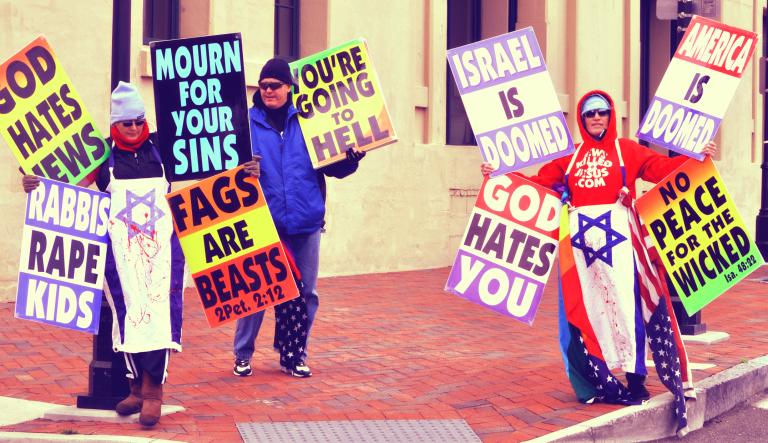
For years, the Westboro Baptist Church have been synonymous with bigotry. I learned this when they protested at my high school in 2004 over a production of The Laramie Project (documented by my embarrassing teenager blog). A large counter protest was organized, and an event originally sparked with hate turned into a largely positive, jovial affair. The Phelps clan were woefully outnumbered, and they left rather quickly, while the crowd left behind cheered and laughed and prayed together. As an eighteen year old, it was a formative experience.
Since then, I’ve always maintained a mild interest in the WBC story. Adrian Chen’s excellent profile on Megan Phelps-Roper is the latest chapter in a series of rumors and stories about disaffected members who reject their family’s tactics of protest and hateful rhetoric toward, well, everyone really. It’s definitely worth a read, but here are a few of my favorite points.
Phelps-Roper’s conversion from the WBC is essentially a result of her exposure to contrary ideas. It’s an old adage that arguing on the internet is a futile exercise, but this case kind of disproves that. By engaging with the people her religion taught her to hate, she learned to appreciate them and see them as more than just heathens.
“I wanted to be like really nice so that they would have a hard time hating me,” he said. One day, he tweeted about the television show “Gossip Girl,” and Phelps-Roper responded jocularly about one of its characters. “You know, for an evil something something, you sure do crack me up,” Abitbol responded.
In discussing the recent Mormon policy of excluding baptism and automatically excommunicating members in a same-sex marriage, a lot of commentators have theorized that the church is actively looking to keep LGBT families out of congregations for the very same reason. Most people who have a change of heart concerning gay rights cite experiences with close friends or family as the primary cause of such changes. By limiting opportunities to see functioning families headed by a same-sex couple, the church is trying to diminish attitude shifts toward homosexuality. But if members of the Phelps family can change their minds about gay people, it is certainly reasonable that Mormons can grow more accepting as well.
The other part that stood out to me, again in relation to the church’s new policy, was that Phelps-Roper believed WBC’s actions are actually grounded in love rather than hate.
One of the most common questions she was asked on the picket line was why she hated gay people so much. She didn’t hate gay people, she would reply, God hated gay people. And the rest of the world hated them, too, by cheering them on as they doomed themselves to Hell. “We love these fags more than anyone,” she would say.
The Mormon Church’s defense of their policy might be considerably less harsh in its language, but it is still conceptually similar. Exclusion of families involved in same-sex marriage is said to be a protective measure, a show of love by preventing potential conflicts.
The thing is, actions speak louder than words. The WBC can say they love gay people all they want, but it is a message lost in all their signs that proudly display hate and condemnation. In Mormonism, we can say the same thing, but what use is it if we don’t actually let them participate in the ordinances that are at our foundation?
Aside from those issues, I think Megan Phelps-Roper’s story is particularly beautiful because of how hopeful it is. In a very short time, and through a very difficult faith transition, she’s learned to question the principles she was taught since her youth. True Christianity is about love, and it is about personal change and growth. Megan Phelps-Roper experienced that change by accepting the people she was told to hate, and the public, which has grown to hate the WBC, are experiencing Christ-like love by welcoming her and forgiving her for her past actions.
As more and more members of the Phelps family abandon their message of hate, does the future of the Westboro Baptist Church include a renewed mission to fighting against bigotry? That would be ironic, but from someone currently a member of a church with an embarrassing stance on homosexuality, I find it a truly hopeful thought.











